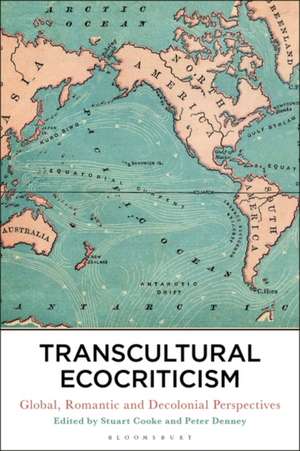Transcultural Ecocriticism: Global, Romantic and Decolonial Perspectives
Editat de Dr Stuart Cooke, Dr Peter Denneyen Limba Engleză Paperback – 24 aug 2022
| Toate formatele și edițiile | Preț | Express |
|---|---|---|
| Paperback (1) | 199.45 lei 6-8 săpt. | |
| Bloomsbury Publishing – 24 aug 2022 | 199.45 lei 6-8 săpt. | |
| Hardback (1) | 570.68 lei 6-8 săpt. | |
| Bloomsbury Publishing – 10 feb 2021 | 570.68 lei 6-8 săpt. |
Preț: 199.45 lei
Preț vechi: 258.78 lei
-23% Nou
Puncte Express: 299
Preț estimativ în valută:
38.17€ • 39.95$ • 31.77£
38.17€ • 39.95$ • 31.77£
Carte tipărită la comandă
Livrare economică 31 martie-14 aprilie
Preluare comenzi: 021 569.72.76
Specificații
ISBN-13: 9781350213821
ISBN-10: 1350213829
Pagini: 304
Ilustrații: 10 bw illus
Dimensiuni: 156 x 234 x 21 mm
Greutate: 0.43 kg
Editura: Bloomsbury Publishing
Colecția Bloomsbury Academic
Locul publicării:London, United Kingdom
ISBN-10: 1350213829
Pagini: 304
Ilustrații: 10 bw illus
Dimensiuni: 156 x 234 x 21 mm
Greutate: 0.43 kg
Editura: Bloomsbury Publishing
Colecția Bloomsbury Academic
Locul publicării:London, United Kingdom
Caracteristici
Reveals new connections between indigenous studies, world literatures and the latest work in Romantic postcolonial ecocriticism
Notă biografică
Stuart Cooke is Senior Lecturer in Creative Writing and Literary Studies at Griffith University, Australia.Peter Denney is Senior Lecturer in History at Griffith University, Australia.
Cuprins
Chapter 1Thinking about Transcultural Ecocriticism: Space, Scale and TranslationStuart Cooke and Peter Denney PART A: Planetary LocalitiesChapter 2Urban Narrative and Climate ChangeUrsula K. Heise Chapter 3Scaling Down Our Imagination of the Human: Ted Chiang and the Fable of ExtinctionChris DantaChapter 4'Re-enchanting the world' from Mozambique: the African Anthropocene and Mia Couto's poetics of the planet Meg Samuelson Chapter 5Ecological Imaginations in Contemporary Chinese Science FictionMengtian Sun PART B: Beyond the Romantic FrontierChapter 6The Colonial Translation of NaturesAlan BewellChapter 7 Sensing Empire: Travel Writing, Picturesque Taste and British Perceptions of the Indian Sensory EnvironmentPeter DenneyChapter 8 The Dark Side of Romantic DendrophiliaVe-Yin Tee Chapter 9Shaping Selves and Spaces: Romanticism, Botany and South-West Western AustraliaJessica White PART C: Decolonial PoeticsChapter 10Transcultural Ecopoetics and Decoloniality in meenamatta lena puellakanny: Meenamatta Water Country DiscussionPeter MinterChapter 11 Theorising Decolonised Literary EnvironmentsStephen MueckeChapter 12Placing Invisible Women: Environment, Space and Power in Two Works by Ana Patricia Martínez HuchimMaia Gunn WatkinsonChapter 13Geoterritorial Island Poetics, or Transcultural Composition with a Wetland in Southern ChileStuart Cooke, with Juan Paulo Huirimilla OyarzoIndex
Recenzii
Containing essays predominantly by Australians but including scholarship from around the Pacific Rim and beyond, Transcultural Ecocriticism illuminates the environmental dimensions of literary works from Vietnam, Mozambique, China, the U.S., Chile, Britain, and India, as well as Australia, with generous representation of Indigenous cultures. The genres considered are also diverse, as the authors examine the resources for environmentalism and environmental justice of fables, fantasy, science fiction, oral traditions, travel writing, novels, and poems. The thinking here is indeed transcultural, linking carefully situated knowledges to one another as well as to global concerns and planetary responsibilities. Such bringing together of localized particularities with large-scale thinking about global crises, deep time, and planetary space is precisely what's needed in the environmental humanities now. A section of essays on Romanticism valuably highlights intersections of Romantic thinking about nature with colonial oppression, while another cluster of essays explores recent decolonial projects. Several of these present groundbreaking transcultural collaborations between Anglo-Australian and Indigenous (Aboriginal, Mapuche) artists. These exciting projects demonstrate the transformative and liberatory potential of opening to the eco-philosophies of other cultures. As readers of this important collection are introduced to works and traditions of literature they had not previously known, they will gain appreciation for the powerful resources offered by transcultural ecocriticism, especially those in which Indigenous onto-ecologies are at play, for responding, as Peter Minter observes, "to climate change and, among other things, its liability to regimes of coloniality."
